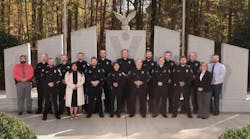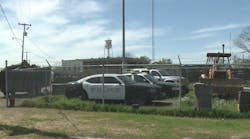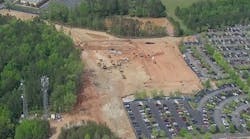Baltimore police say they plan to crack down on the city's notorious dirt bike riders, pledging to infiltrate the groups using social media and undercover officers in an effort to disrupt the packs of riders.
Police Commissioner Anthony W. Batts said the popularity of the documentary "12 O'clock Boys" -- a reference to the high-flying wheelie pose that riders strive to achieve -- has "glorified" dirt bike riding and drawn enthusiasts from other states. It is illegal to operate the motorized bikes anywhere in Baltimore.
Batts said police and prosecutors plan to target the rides' organizers.
"If you're organizing these dirt bikes, if you're organizing to come to Druid Hill Park on Sundays or ride through the neighborhood, I think you should be held accountable," Batts told residents at a neighborhood forum this week. He said he hopes to seize as many bikes as possible and "crush them."
Some neighborhood leaders have long criticized the police for not doing more to control the riders, who swarm over neighborhoods in packs of 40 or 50 at a time, popping wheelies and performing tricks as they weave in and out of traffic.
But not everyone agrees on the best way to deal with the subculture that has channeled some young men and boys away from violence and drugs into the world of motocross, attracted by the thrill of riding fast and impressing one another with feats of athleticism.
Some city leaders, including Councilman Carl Stokes, want Baltimore officials to explore creating a space where people can ride the bikes legally, possibly on trails or in a park.
"It is part of the popular culture -- not the hoodlum culture, but popular culture," Stokes said. The city should try to accommodate dirt bike riding like it has skateboarding and mountain biking, he said.
One enthusiast, Christian "Ying" White, said the riding is misunderstood.
"We're not doing nothing bad -- we're not selling drugs, we're not shooting nobody," said White, an 18-year-old West Baltimore resident known for a trick where he touches the ground with both hands while popping a wheelie. "It's like a Baltimore sport."
Residents of neighborhoods who feel besieged by the bikes see it differently.
"People feel their life is in danger when dozens of them swarm around you on a neighborhood street," said Del. Shawn Z. Tarrant, a Baltimore Democrat whose district includes Druid Hill Park, a hotbed for the riders. "It's a huge nuisance," Tarrant said.
He said the bikers and their associates stop traffic to let packs of the riders pass through intersections, creating a sense of lawlessness. Tarrant worked to see passage of state legislation last year that allows law enforcement to suspend driver's licenses for people caught driving the bikes on highways.
Tarrant said he is concerned about the safety of riders, other motorists and pedestrians. His emphasis has been on the safety hazards. But he is cognizant of the predicament presented by enforcing dirt bike laws and involving more young men in the criminal justice system.
"All I am trying to do is say, 'Hey, there is a consequence to pay for being bold and breaking the law and putting people's lives in harm's way because you want to have fun," he said.
As authorities step up their efforts to combat the illegal pastime, they will have to determine not only what to do with the riders, but with their bikes.
Evidence of the city's situation sits in the impound lot on Pulaski Highway in East Baltimore, where more than 800 of the confiscated bikes -- Hondas, Kawasakis and Yamahas, some adorned with stickers such as "666" and "Woody" from "Toy Story" -- sit in pens behind 10-foot fencing, rusting and choked by vines.
Paul W. Tolle, the towing division chief who oversees the Pulaski Highway lot, said the bikes have filled two pens and he is now using a third. City officials years ago tried selling or donating the vehicles, but abandoned the effort.
Lotfy Nathan, the Los Angeles-based filmmaker and Maryland Institute College of Art alumnus who made the "12 O'clock Boys" documentary, said urban dirt bike riding exists in other cities, but it is "definitely most high octane and tumultuous in Baltimore.
"There is a degree of lawlessness in Baltimore that allows this to happen," Nathan said.
Riders describe their hobby as an alternative to violence -- many post videos with the slogan "Guns down, bikes up" -- and a means of bringing people together.
"Look at how many people you see in a dirt bike pack on a Sunday," said a 17-year-old rider from East Baltimore, who asked to be identified by his nickname of "Doodie" because he fears police retaliation.
"You might see 100 bikes. That's 100 people coming from all over the city, people who don't know each other, or who never liked each other and was at war," he said. "Now they're the best of friends" because they're impressed with each other's skills.
The city's top prosecutor, Gregg L. Bernstein, said he shares the police commissioner's commitment to holding riders criminally responsible for their transgressions. His office announced several recent sentences for illegal riding, including a man who was sentenced in July to 90 days in prison and 18 months of supervised probation.
"Dirt bikes on the city streets are a menace to the driving [public] and pedestrians," Bernstein said. "They are an extreme nuisance to citizens who reside in the city in terms of the impact that they have on peace and quiet and enjoyment, and they are dangerous to people who come into contact with them."
Although he didn't immediately provide detailed evidence, Bernstein said the dirt bikes are sometimes used in other criminal activities, such as shootings and robberies.
"The vast majority of young people are doing it for their own enjoyment," he said. However, "I do believe they are also sometimes a vehicle by which other criminal activity occurs."
Lt. Col. Sean Miller told residents at a community forum Monday night that police plan to throw an array of resources at the riders, including "infiltrating these organizations within social media networks as well as with possible undercover officers deployed among them in a covert surveillance capacity."
Last year, police targeted riders by locating the garages where they stored the bikes, and seizing them.
A police spokesman, Detective Sgt. Jarron L. Jackson, said about 830 dirt bikes are in the city's impound lot. The city collected 1,805 dirt bikes and ATVs from 2009 to 2013, for an average of 361 a year. So far this year, police have seized about 80. Police took in the most bikes -- 408 -- in 2012.
Once the bikes are taken to the city yard, notification is sent to registered owners within 72 hours if they can be located, officials said. Owners must provide proof of purchase, although officials estimate that only about 10 percent to 20 percent of the bikes are claimed.
If a bike is seized for investigational purposes, it will remain in police custody until the case is closed.
Tolle, who oversees the impound yard, said city lawyers are evaluating the options for what to do with the bikes, including selling them at public auction, destroying them, donating them to humanitarian causes overseas or dismantling them and selling the parts.
After outlawing the operation of the bikes in Baltimore in 2000, the City Council agreed to donate some to pastors and teachers working in Ghana, but many officials don't consider that endeavor a success, saying some of the bikes ended up back in the Pulaski Highway impound lot.
Other cities, including Washington, sell the unclaimed bikes at public auction. Baltimore brought in $20,000 when it auctioned off about 200 bikes in 2004.
"The sad thing about destroying them is, they have a value, let's face it," Tolle said. "But how do we assure the mayor, the public safety officials and the people who pay their taxes in Baltimore City, that we're not putting that bike back out on the street to cause them more harm or damage?
"That's a huge question we have to answer, and it has ethical implications."
Copyright 2014 - The Baltimore Sun
McClatchy-Tribune News Service


